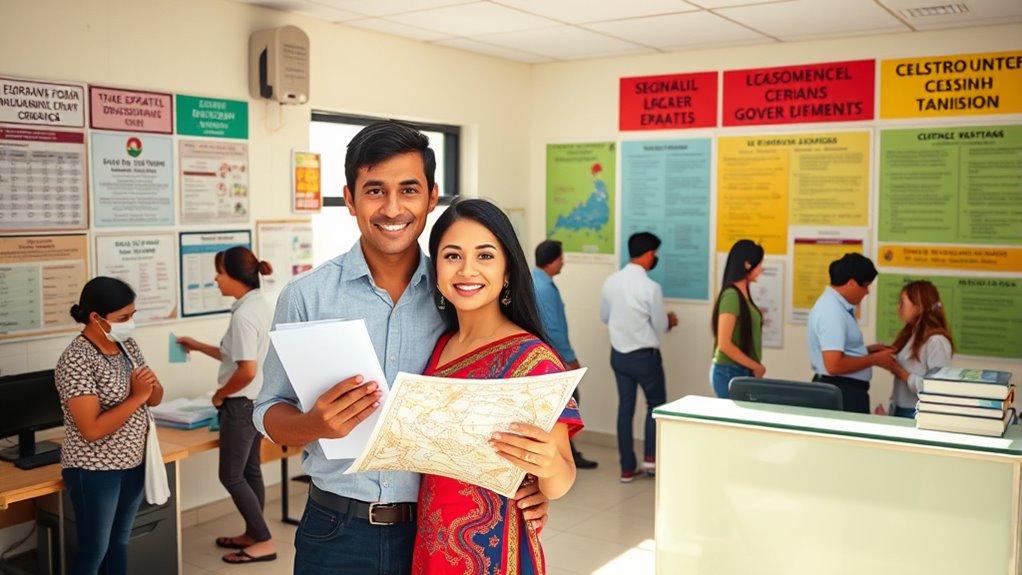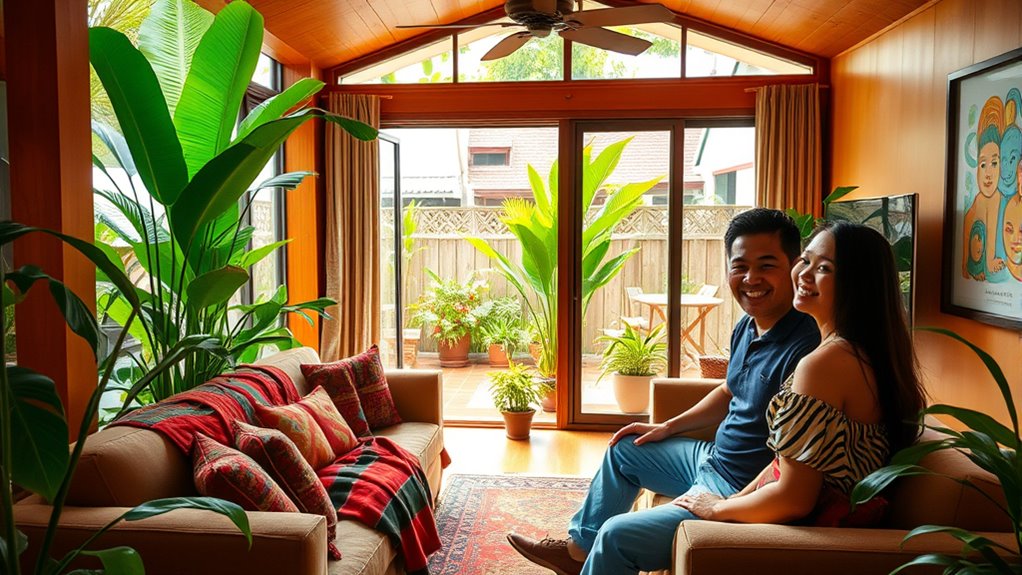When moving to the Philippines with your Filipina wife, expect to navigate visa requirements and secure necessary permits for a smooth changeover. You’ll need to adapt to a collectivist culture and embrace local customs, which can greatly enrich your experience. Financially, set up a budget and consider local banking options to manage your expenses effectively. As you settle in, you’ll discover various housing options that fit your lifestyle. There’s so much more you can explore about this journey ahead.
Key Takeaways
- Understand visa and residency requirements, including obtaining the Alien Certificate of Registration Identity card for long stays.
- Embrace local culture and language; learning Tagalog can enhance social integration and relationships.
- Be prepared for varying healthcare options, opting for private care for better services in urban areas.
- Create a realistic budget considering local living costs and currency exchange rates to manage finances effectively.
- Engage with community activities and expat groups to foster connections and support during your transition.
Legal and Administrative Aspects of Relocation

When considering a move to the Philippines with your Filipina wife, what legal and administrative aspects should you keep in mind?
First, you’ll need to navigate visa requirements; non-immigrant visas are vital for work or study. If you stay longer than 59 days, obtaining an Alien Certificate of Registration Identity card (ACR I-Card) is essential.
Remember that both parents must consent to significant decisions regarding children under Philippine family law. Employment contracts should adhere to fair treatment and fairness, especially during relocations.
You’ll also need to guarantee compliance with financial requirements for visas and understand tax obligations based on your residency.
Finally, familiarize yourself with property acquisition rules, as foreigners face restrictions on land ownership.
Navigating Cultural and Social Integration

As you settle into life in the Philippines with your Filipina wife, steering cultural and social integration is essential for a smooth shift.
Start by learning Filipino or Tagalog; enrolling in language classes or hiring a tutor can greatly enhance your communication skills. Practice with locals and participate in language exchange programs.
Embrace the collectivist culture by respecting social norms and adapting to a more relaxed concept of time. Engaging in local festivals like Sinulog and Christmas not only deepens your understanding of traditions but also showcases the importance of family in Filipino culture. Additionally, understanding the significance of dance in various Filipino celebrations can further enrich your cultural experiences. Participating in these celebrations helps you to foster collaboration with locals and build lasting relationships.
Join expat communities or local clubs, and volunteer for community projects to build connections.
Finally, embrace local customs, food, and the spirit of “bayanihan” to enrich your experience and foster meaningful relationships.
Financial Considerations for Expatriates

Settling into life in the Philippines with your Filipina wife involves not just social integration but also careful financial planning.
Start by creating a budget to manage daily expenses effectively. Understand currency exchange rates and consider opening a local bank account to simplify transactions and reduce fees. Using Forex cards can help minimize exchange rate risks. Additionally, consider investment growth through various financial instruments to enhance your savings over time. Incorporating state-specific benefits from retirement planning can further optimize your financial strategy. Remember that diversification is key to reducing risk in your investment portfolio.
Creating a budget and understanding currency exchange rates are essential for managing daily expenses effectively in the Philippines.
As a tax resident, be aware that your global income is taxable, but tax treaties can prevent double taxation. Setting clear financial goals will guide your investment strategies, whether in local real estate or retirement plans. Additionally, consider the implications of Required Minimum Distributions when planning for your retirement savings abroad, as they can significantly impact your retirement savings plan.
Remember to maintain an emergency fund for unexpected expenses and seek professional advice for savvy financial decisions. Tracking expenses is essential for adjusting your budget accordingly.
Housing and Accommodation Options

Finding the right housing option in the Philippines is essential for a smooth shift to your new life. You’ll discover diverse choices, from spacious standalone houses perfect for families to practical apartments near essential amenities.
If you’re seeking luxury, consider condominiums that offer pools and gyms. For a tropical experience, beachfront properties in Boracay or Palawan may catch your eye.
Think about your location—urban areas like Manila provide high-end options, while cities like Davao and Iloilo offer affordability. Consider commuting times and access to shopping and services.
You can find budget-friendly options like suburban residences or short-term rentals through platforms like Airbnb. Whatever you choose, make sure it aligns with your lifestyle and budget for a comfortable shift.
Healthcare and Well-being in the Philippines

Maneuvering the healthcare system in the Philippines can be a bit challenging, but understanding its structure and options will help you prioritize your well-being.
The system is divided into public and private sectors, with public hospitals focusing on preventive and primary care, while private hospitals offer specialized services. The Universal Health Care Law aims to improve access, enrolling all Filipinos in PhilHealth.
Costs vary; public services are often free or low-cost, while private care can be expensive. Disparities exist between urban and rural healthcare, often leading expats to choose private options.
Frequently Asked Questions
What Are the Best Local Customs to Understand Before Moving?
Before moving, it’s essential to understand Filipino customs. Embrace their hospitality and politeness—you’re likely to feel welcomed.
Show respect for elders, perhaps by practicing the “mano” gesture. Dress modestly, especially in formal settings, and steer clear of sensitive topics like religion and politics.
Learning basic phrases can go a long way in building connections. Finally, be prepared to share meals, as communal dining is a cherished tradition in the Philippines.
How Can I Build a Social Network in the Philippines?
To build a social network in the Philippines, start by attending local festivals and community events.
Get involved in neighborhood activities to meet locals and appreciate Filipino culture.
Join expat groups and participate in their gatherings to connect with fellow expatriates.
Explore social clubs that align with your interests, and leverage social media platforms to stay in touch with new acquaintances.
Regularly invite friends for coffee to foster deeper connections.
What Leisure Activities Are Popular Among Locals?
Leisure activities in the Philippines are like a vibrant tapestry, weaving together adventure and culture. Locals flock to beaches for snorkeling and surfing, while mountain trails call for hiking and trekking.
Caving and whitewater rafting thrill the adventurous, and sailing in Palawan is breathtaking. You’ll find karaoke echoing in gatherings, and vibrant festivals celebrating local traditions.
Whether you’re indulging in Filipino cuisine or exploring historical sites, there’s always something to enjoy!
How Do I Navigate Transportation Systems in Urban Areas?
Maneuvering transportation systems in urban areas can be a bit overwhelming at first, but you’ll get the hang of it.
Start by familiarizing yourself with jeepneys, buses, and the MRT. Download local apps for real-time schedules and routes.
Cash works best for jeepneys and tricycles, while buses often accept tickets bought at terminals.
Be prepared for traffic, especially in Metro Manila, and keep an eye out for smart systems that aid navigation.
What Are the Common Challenges Faced by Expatriates in the Philippines?
Expatriates in the Philippines commonly face several challenges. You might struggle with the high cost of living in urban areas, leading to financial strain.
Culture shock can hit hard, making social integration difficult. Language barriers may arise, even with English being widely spoken.
Additionally, managing healthcare access and understanding local legal requirements can be complex.
Finally, adapting to a new environment requires patience, as you and your family adjust to local customs and norms.
Conclusion
Moving to the Philippines with your Filipina wife can feel like sailing into uncharted waters. You’ll face challenges, but each wave can teach you something new. For instance, when I first arrived, I struggled with the language barrier, much like trying to navigate a dense fog. But as I learned Tagalog, the world gradually became clearer. Embrace the journey, connect with locals, and you’ll find that the warmth of the community makes every challenge worthwhile.









